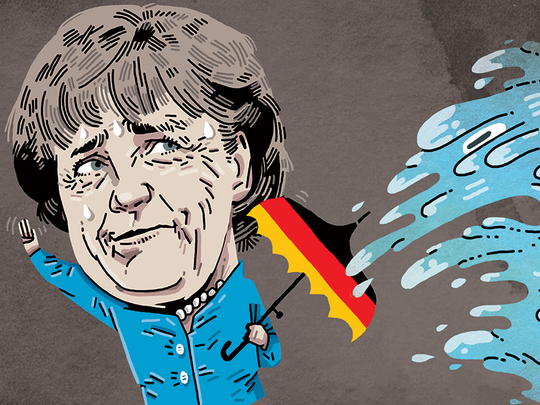
Perhaps it’s a useful dose of realism: As it turns out, Germany is not so exceptional after all. It’s true that German voters have just given the ruling Christian Democratic Union yet another majority. It’s true that Angela Merkel will remain chancellor for a remarkable fourth term, according to exit polls. But Germany did not escape the western populist wave altogether.
The full election result is hard to express simply, but here goes: Merkel’s centre-right Christian Democrats did worse than before, and worse than expected. The centre-left Social Democrats went the way of the centre-left across the continent and did much worse than before, and much worse than expected. Smaller parties, such as the liberals, the Greens and the far-left, did better than before. And the Alliance for Germany (AfD), the anti-immigration, anti-European Union, anti-Nato party, did better than ever before, winning a projected 13.5 per cent of the vote.
The upshot: As in the Netherlands, Austria, France, Poland — and, let’s face it, the United States, Britain, Hungary, Sweden, Finland, Italy and just about everywhere else — the nationalist far-right will now have a loud voice in mainstream politics in Germany.
The impact will be felt most strongly in Germany itself, because several dozen brand-new, far-right politicians will be members of the Bundestag. This is a cohort with no particular devotion to the norms of the German political system, with its traditions of collegiality and compromise, so German politics might get less agreeable. Already, an online conspiracy campaign, linked to the AfD, is beginning to push a line about “election fraud,” and a leading AfD politician has said his party will now “hunt” for Merkel full time. It’s also a group that is most cohesive around one issue — its rejection of Merkel’s humanitarian decision to admit large numbers of refugees — so expect the focus on that issue, and the attendant hysteria, to grow. Finally, it’s a group that had open and active Russian support on social media, so expect a larger and louder online Russian presence too, and even more pro-Russian voices in Germany.
Wobblier partnership
There will also be an impact abroad. Merkel will now need to hold together a more fractious coalition, probably including liberals and Greens. That may make it more difficult for Germany to carry out the revolutionary reforms that are needed to make the European Union more cohesive, both in its economics and its foreign policy. The expected Merkel-Emmanuel Macron partnership just becomes a little wobblier. And although Merkel will remain staunch in her opposition to Russia’s war in Ukraine, it’s conceivable that this line will get harder to hold.
But there’s an upside to this election result, too. Germany is no longer a saintly outlier — and maybe that’s good. What had been Germany’s expanding sense of moral superiority — toward France, Poland and other neighbours with raucous nationalist politicians; toward the United States with its dysfunctional White House — will rapidly diminish. Germany now becomes one of a team of countries fighting similar problems, rather than a disinterested outsider. The leading political minds of the richest country in Europe are now forced to focus with a good deal more urgency on calming the anti-immigrant, anti-EU emotions in their own country, instead of just denouncing it in others.
This is important, because German policy — on refugees, money and much else — is itself the source of some of these emotions, or at least that’s how many perceive it. Finally, Germany will be forced to confront these issues at home. So yes, Merkel keeps her job, but that job just got harder.
— Washington Post
Anne Applebaum is a columnist and Pulitzer Prize winning author who has written extensively about Europe. She is a visiting Professor of Practice at the London School of Economics.









